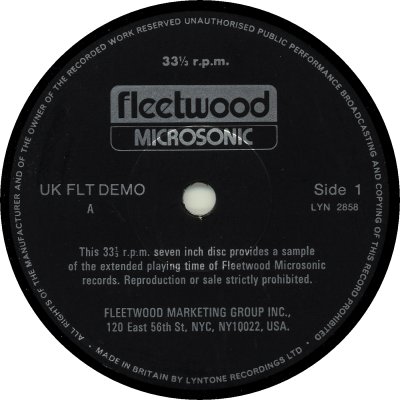
A debatable one, as I don't usually consider advertising / promotional records to be 'labels' for the purposes of this site; Fleetwood Microsonic got the benefit of the doubt on the grounds that it was a proper label in the U.S.A. and that it offers a look down one of recorded music's cul-de-sacs. Fleetwood Records was started by Vincent Giarusso and Raymond Samore in the late 1950s in Revere, Massechusetts. It led what appears to have been an unremarkable life for more than a decade, but then its chief engineer William Ferruzzi developed a system for packing far more music onto a vinyl record than usual. 'Billboard' magazine of the 25th of March 1972 says that the company claimed that it could fit eighteen minutes of music onto each side of a 7" record and forty-five minutes on to each side of a 12" using "A computer-controlled needle arm which feeds sound identification more precisely than ever before possible." Fleetwood referred to the process as 'Microsonic grooving', hence the label name. Once the master had been cut, the actual pressing could be done at any plant. A number of 12" and 7" Fleetwood Microsonic records were made commercially available in the United States, and before long Fleetwood sought to attract the attention of overseas record companies. In the U.K. it established a London branch, the Fleetwood Recording Co., and it produced an EP which demonstrated the system's capabilities. The record had a selection of uncredited Classical pieces on one side and five pieces of various kinds of Popular music on the other; it was merely a promotional tool and was never intended for sale. Pressing was carried out by Lyntone; the matrix number, LYN-2858 / 2859, enables us to establish that it was made in 1974. Sadly the process seems not to have caught the imagination of the British record industry, as no more Fleetwood Microsonic records saw the light of day here. A couple of years later a British firm introduced its own technique for squeezing an album's worth of music onto a 7" disc - see the Clearwater Microgroove page - but that, too, failed to catch on. The sound quality of the Fleetwood EP is decent enough but rather light on bass.


Copyright 2016 Robert Lyons.

